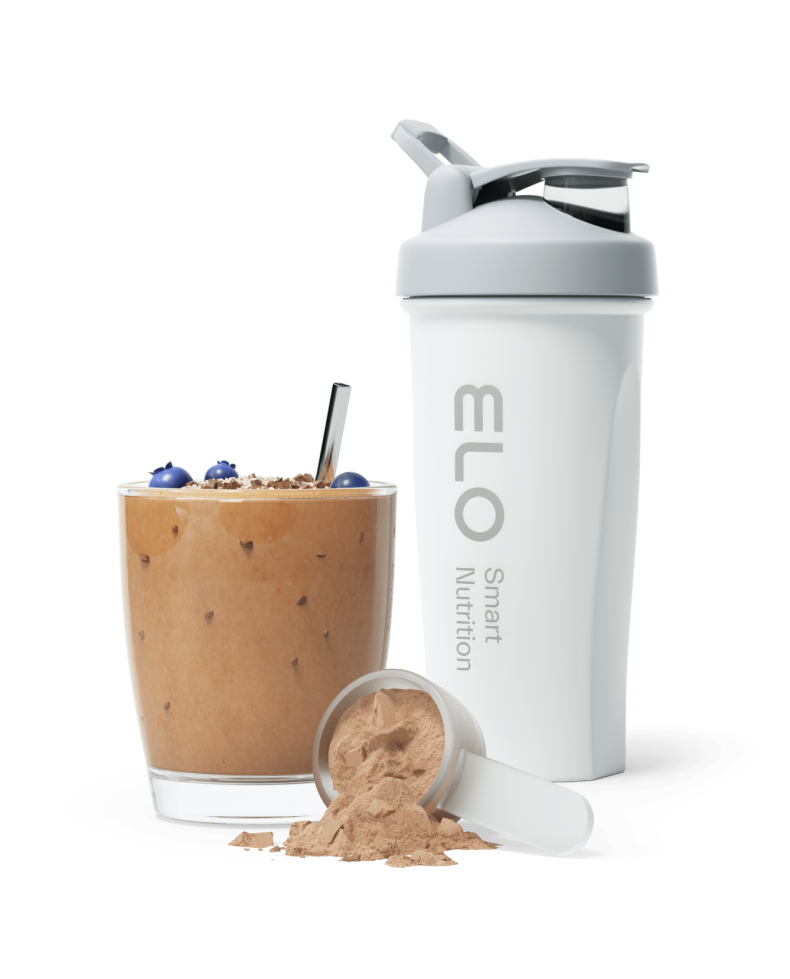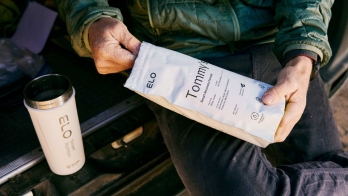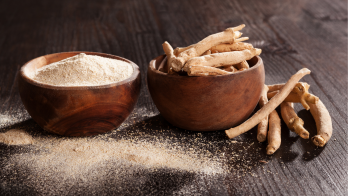The ultimate guide to pre workout for men
Do you want to exercise but are feeling a bit low on energy? Pre-workout supplements can help. From health benefits to side effects, here’s what science has to say about pre workout for men.

It’s unrealistic to turn up to every workout feeling your very best. Maybe you didn’t get a good night’s sleep, or perhaps you’re just not feeling motivated that day. That’s where taking a pre-workout supplement can help–it provides a little pick-me-up to power you through a workout when you’re feeling a little low on energy.
However, between the wide range of powders, pills, and drinks, choosing the right pre-workout supplement can feel daunting. And since pre-workout supplements are often praised by athletes and gym-goes alike, you may be wondering if it actually works.
In this guide, we are doing a deep dive to see if pre-workout stands up to the research. From health benefits to side effects, here is what you need to know about this popular exercise supplement.
Disclaimer: While pre-workout supplements may provide a boost in energy and performance, they should be used in conjunction with a balanced diet and consistent exercise routine in order to see optimal results.
What does pre workout do?
Pre-workouts are a blend of various supplements that are designed to boost energy levels and increase focus. Some common ingredients found in pre-workout supplements include beta-alanine, caffeine, citrulline, tyrosine, taurine, creatine, niacin, and arginine [ 1
Note: If you frequently lack energy or have difficulty making it through your workout, supplements may not be the right answer for you. Instead, consider other lifestyle factors (like hydration, sleep, and diet) and adjust as needed before trying a pre-workout supplement.
When to take pre workout
Generally speaking, it’s recommended to take your pre-workout supplement 15-30 minutes before starting your workout, as this will allow enough time for the ingredients to take effect [ 2
However, this timeframe will vary depending on the specific product and its ingredients.
How long does pre workout last?
The effects of most pre-workout supplements can last around 2 hours, but this can vary based on the ingredients, as well as individual factors (such as age, weight, and overall health). For example, it can take between 1.5 - 9 hours for caffeine to wear off, whereas arginine can dissipate in 1 - 2 hours [ 3 4
How to take pre workout
Many pre-workout supplements include instructions on how to take them. However, here are some helpful tips to get you started.
Start small: If you are new to pre-workout supplements or are sensitive to certain stimulants, try starting with a small dose to assess your tolerance level.
Stay hydrated: Pre-workouts are stimulants, which means they can have a diuretic effect that may contribute to dehydration. As such, it's important to stay hydrated before, during, and after your workout.
Follow the recommended dosage: Pay attention to dosing recommendations and take care not to exceed them. Taking too much of a pre-workout supplement can increase the risk of side effects.
The best pre workout for men
The best pre workout for men will vary depending on your specific goals and preferences. Here are some beneficial ingredients that you may want to consider having in your pre-workout.
Creatine monohydrate: Creatine is a common ingredient in pre workout supplements that has been found to increase the production of ATP, a molecule that provides energy to cells. This can lead to increased strength, power, and overall athletic performance [
5
].BCAAs: Branch chain amino acids (BCAAs) have been found to improve endurance during a workout and increase strength by supporting protein synthesis [
6
,7
].Taurine: Taurine is a sulfonic acid that may minimize oxidative stress and be beneficial against eccentric exercise damage [
8
].B vitamins: Studies indicate that the B vitamins (such as vitamins B1, B2, and B3) may play a fundamental role in energy metabolism [
9
].
Benefits of pre workout for men
Athletes and gym-goers alike have long touted the benefits of pre workout supplements, but are these claims substantiated? From endurance to performance, here’s what the science has to say about pre-workout benefits for men.

Improved endurance
Beta-alanine is a common pre workout supplement ingredient that can reduce the lactic acid build-up in your muscles and help improve endurance.
Notable research has found that physically active adults who supplemented with beta-alanine experienced reduced lactate concentration and an improved 10 km running time compared to those who didn’t supplement [ 10 11
Helps build lean muscle
Research indicates that you can increase lean muscle mass by taking a pre-workout in conjunction with resistance training [ 12 13 14 15

Enhanced physical performance
Studies show that people who take caffeine before working out may experience delayed perceptions of fatigue, pain, and effort, preserved muscle glycogen content, and increased time to exhaustion [ 16 16
Other research has found that those who took pre-workout supplements in conjunction with HIIT exercises had a significant increase in VO2 max, training volume and lean body mass compared to those who didn’t take pre-workout [ 17

Recover better with Elo Smart Protein
While pre-workout supplements can help improve your fitness, what you take after a workout is arguably just as (if not more) important.
Elo Health Smart Protein
Unlike other custom protein products, Elo Smart Protein uses your goals, health history, workout data, and dietary preferences to craft the right protein blend for you and provide specific protein dosing recommendations after every workout.
Order your personalized protein today!
Cons of pre-workout supplements
Despite some notable benefits, pre-workout supplements aren’t right for everyone. Here are some things to consider before taking a pre-workout.
You may build up a tolerance.
If you take pre-workout excessively, you can become immune to some of these effects and build up a tolerance. As such, you will need to take more to continue to feel the same effects.
Might contain artificial sweeteners/added sugar.
Some pre-workout supplements may have added sugar 18 19
They are not regulated.
Because pre-workout supplements aren’t regulated, they may not be entirely safe and can be dangerous to the general public. This is especially important for athletes, since supplements that are not third-party tested 20 21 this article
Pre workout side effects
Pre workout side effects can vary based on the ingredients present. For instance, excess caffeine can cause jitters, anxiety, insomnia, nausea, increased heart rate, and dehydration [ 22
You should also avoid pre-workout supplements if you have high blood pressure or diabetes, and/or take certain medications.
Lastly, pre-workout supplements that contain caffeine, taurine, and glucuronolactone have been shown to increase arterial blood pressure and compromise endothelial function in healthy individuals [ 23 24 25
Be sure to talk to your doctor before adding a pre-workout supplement to your routine.
Does pre workout go bad?
Pre-workout can go bad if it’s stored incorrectly and the expiration date is left unchecked, so it’s important to check the packaging and make sure it’s stored in a sealed container.
However, even if a pre-workout supplement has not reached its expiration date, it may still lose effectiveness over time due to the breakdown of the active ingredients. If you are unsure about your product, you may want to err on the side of caution and discard it.
Best pre workout meal
The best pre workout meal is the one that is most compatible with your body, gym routine, and weekly schedule. This will look different for everyone, so listen to your body to find what works best for you.

Natural pre workout ideas
While you can take a specific pre-workout supplement, chances are that you already have a natural pre workout meal in your pantry or fridge. Here are some natural pre workout ideas that you can enjoy one hour before a workout.
Apples and peanut butter
Banana
Greek yogurt and fruit
All natural nutrition bar with protein
A small cup of regular coffee or tea
Chocolate-covered coffee beans
You can also try to incorporate a pre-workout supplement into your daily meals, such as blending them into your morning smoothie.
Summary
Pre-workout supplements are meant to be taken ~30 minutes before exercise and can be especially helpful when you’re feeling a bit low on energy. This little pick-me-up can do wonders for your workout session, as studies show that it can help enhance athletic performance, boost strength, and increase endurance. However, pre-workout supplements are not for everyone, as they can lead to negative side effects, and may not be suitable for people on certain medications.
Disclaimer: The text, images, videos, and other media on this page are provided for informational purposes only and are not intended to treat, diagnose or replace personalized medical care.
Key takeaways
Pre-workouts are a blend of various supplements that are designed to boost energy, focus, performance, and muscle protein synthesis during exercise.
The best pre workout for men will vary depending on your specific goals and preferences.
Pre-workout supplements have been shown to increase endurance, build lean muscle, and enhance exercise performance.
Pre-workout supplements can contain added sugars or artificial sweeteners, might cause some side effects, and may not be suitable for people taking certain medications.
Follow up your workout with Elo Smart Protein, a post-workout recovery product that provides specific protein dosing recommendations.
References
Jagim, A. R., Harty, P. S., & Camic, C. L. (2019). Common Ingredient Profiles of Multi-Ingredient Pre-Workout Supplements. Nutrients, 11(2), 254.
https://doi.org/10.3390/nu11020254
Workout supplements. The Nutrition Source. (2022, April 27). Retrieved January 12, 2023, from
https://www.hsph.harvard.edu/nutritionsource/workout-supplements
Pharmacology of Caffeine - NCBI Bookshelf. (n.d.). Retrieved January 12, 2023, from
https://www.ncbi.nlm.nih.gov/books/NBK223808/
Arginine & citrulline - protocol for life balance. (n.d.). Retrieved January 12, 2023, from
https://www.protocolforlife.com/wp-content/uploads/2018/10/P0037-Arginine-and-Citrulline.pdf
Kreider, R. B., Kalman, D. S., Antonio, J., Ziegenfuss, T. N., Wildman, R., Collins, R., Candow, D. G., Kleiner, S. M., Almada, A. L., & Lopez, H. L. (2017). International Society of Sports Nutrition Position Stand: Safety and efficacy of creatine supplementation in exercise, sport, and medicine. Journal of the International Society of Sports Nutrition, 14(1).
https://doi.org/10.1186/s12970-017-0173-z
Gervasi, M., Sisti, D., Amatori, S., Donati Zeppa, S., Annibalini, G., Piccoli, G., Vallorani, L., Benelli, P., Rocchi, M. B., Barbieri, E., Calavalle, A. R., Agostini, D., Fimognari, C., Stocchi, V., & Sestili, P. (2020). Effects of a commercially available branched-chain amino acid-alanine-carbohydrate-based sports supplement on perceived exertion and performance in high intensity endurance cycling tests. Journal of the International Society of Sports Nutrition, 17(1).
https://doi.org/10.1186/s12970-020-0337-0
Blomstrand, E., Eliasson, J., Karlsson, H. K., & Köhnke, R. (2006). Branched-chain amino acids activate key enzymes in protein synthesis after physical exercise. The Journal of nutrition, 136(1 Suppl), 269S–73S.
https://doi.org/10.1093/jn/136.1.269S
Baliou, S., Adamaki, M., Ioannou, P., Pappa, A., Panayiotidis, M. I., Spandidos, D. A., Christodoulou, I., Kyriakopoulos, A. M., & Zoumpourlis, V. (2021). Protective role of taurine against oxidative stress (Review). Molecular medicine reports, 24(2), 605.
https://doi.org/10.3892/mmr.2021.12242
Gonçalves, A.-C., & Portari, G.-V. (2021). The B-complex vitamins related to energy metabolism and their role in exercise performance: A narrative review. Science & Sports, 36(6), 433–440.
https://doi.org/10.1016/j.scispo.2020.11.007
Santana, J. O., de Freitas, M. C., dos Santos, D. M., Rossi, F. E., Lira, F. S., Rosa-Neto, J. C., & Caperuto, E. C. (2018). Beta-alanine supplementation improved 10-km running time trial in physically active adults. Frontiers in Physiology, 9.
https://doi.org/10.3389/fphys.2018.01105
Spradley, B. D., Crowley, K. R., Tai, C.-Y., Kendall, K. L., Fukuda, D. H., Esposito, E. N., Moon, S. E., & Moon, J. R. (2012). Ingesting a pre-workout supplement containing caffeine, B-vitamins, amino acids, creatine, and beta-alanine before exercise delays fatigue while improving reaction time and muscular endurance. Nutrition & Metabolism, 9(1).
https://doi.org/10.1186/1743-7075-9-28
Harty, P. S., Zabriskie, H. A., Erickson, J. L., Molling, P. E., Kerksick, C. M., & Jagim, A. R. (2018). Multi-ingredient pre-workout supplements, safety implications, and performance outcomes: a brief review. Journal of the International Society of Sports Nutrition, 15(1), 41.
https://doi.org/10.1186/s12970-018-0247-6
Haines, M. S., Dichtel, L. E., Santoso, K., Torriani, M., Miller, K. K., & Bredella, M. A. (2020). Association between muscle mass and insulin sensitivity independent of detrimental adipose depots in young adults with overweight/obesity. International journal of obesity (2005), 44(9), 1851–1858.
https://doi.org/10.1038/s41366-020-0590-y
Willoughby, D., Hewlings, S., & Kalman, D. (2018). Body Composition Changes in Weight Loss: Strategies and Supplementation for Maintaining Lean Body Mass, a Brief Review. Nutrients, 10(12), 1876.
https://doi.org/10.3390/nu10121876
Ilesanmi-Oyelere, B. L., Coad, J., Roy, N., & Kruger, M. C. (2018). Lean Body Mass in the Prediction of Bone Mineral Density in Postmenopausal Women. BioResearch open access, 7(1), 150–158.
https://doi.org/10.1089/biores.2018.0025
Martinez, N., Campbell, B., Franek, M., Buchanan, L., & Colquhoun, R. (2016). The effect of acute pre-workout supplementation on power and strength performance. Journal of the International Society of Sports Nutrition, 13, 29.
https://doi.org/10.1186/s12970-016-0138-7
Smith, A. E., Fukuda, D. H., Kendall, K. L., & Stout, J. R. (2010). The effects of a pre-workout supplement containing caffeine, creatine, and amino acids during three weeks of high-intensity exercise on aerobic and anaerobic performance. Journal of the International Society of Sports Nutrition, 7(1).
https://doi.org/10.1186/1550-2783-7-10
Debras, C., Chazelas, E., Srour, B., Druesne-Pecollo, N., Esseddik, Y., Szabo de Edelenyi, F., Agaësse, C., De Sa, A., Lutchia, R., Gigandet, S., Huybrechts, I., Julia, C., Kesse-Guyot, E., Allès, B., Andreeva, V. A., Galan, P., Hercberg, S., Deschasaux-Tanguy, M., & Touvier, M. (2022). Artificial sweeteners and cancer risk: Results from the NutriNet-Santé population-based cohort study. PLOS Medicine, 19(3).
https://doi.org/10.1371/journal.pmed.1003950
Rippe, J., & Angelopoulos, T. (2016). Relationship between added sugars consumption and chronic disease risk factors: Current understanding. Nutrients, 8(11), 697.
https://doi.org/10.3390/nu8110697
Examine.com. (2022, November 17). 1,3-dimethylamylamine health benefits, dosage, safety, side-effects, and more: Supplements. Examine. Retrieved January 12, 2023, from
https://examine.com/supplements/1-3-dimethylamylamine/
Cohen, P. A., Travis, J. C., Keizers, P. H., Deuster, P., & Venhuis, B. J. (2017). Four experimental stimulants found in sports and weight loss supplements: 2-amino-6-methylheptane (octodrine), 1,4-dimethylamylamine (1,4-DMAA), 1,3-dimethylamylamine (1,3-DMAA) and 1,3-dimethylbutylamine (1,3-DMBA). Clinical Toxicology, 56(6), 421–426.
https://doi.org/10.1080/15563650.2017.1398328
U.S. National Library of Medicine. (n.d.). Caffeine. MedlinePlus. Retrieved January 12, 2023, from
https://medlineplus.gov/caffeine.html
Rodriguez, T. (2022, September 27). Cardiovascular effects of pre-workout caffeine and energy supplements. The Cardiology Advisor. Retrieved January 12, 2023, from
https://www.thecardiologyadvisor.com/general-cardiology/cardiovascular-effects-of-pre-workout-caffeine-and-energy-supplements/
Bahadoran, Z., Mirmiran, P., Tahmasebinejad, Z., & Azizi, F. (2016). Dietary L-arginine intake and the incidence of coronary heart disease: Tehran lipid and glucose study. Nutrition & metabolism, 13, 23.
https://doi.org/10.1186/s12986-016-0084-z
Scientific opinion on the evaluation of the safety in use of yohimbe (Pausinystalia yohimbe (K. Schum.) Pierre ex Beille). (2013). EFSA Journal, 11(7).
https://doi.org/10.2903/j.efsa.2013.3302







